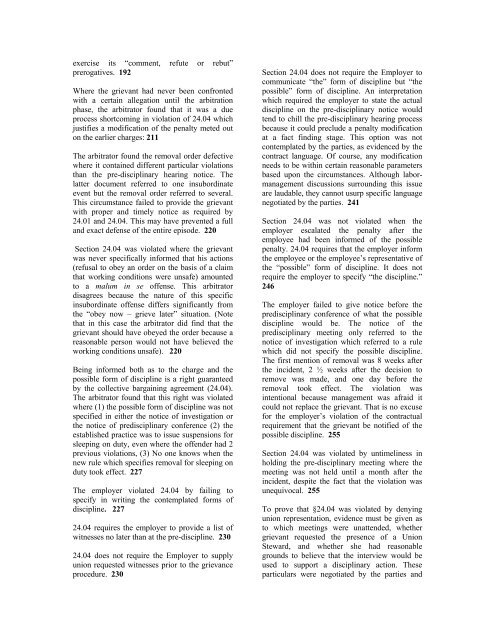by Contract Number (PDF) - OCSEA
by Contract Number (PDF) - OCSEA
by Contract Number (PDF) - OCSEA
Create successful ePaper yourself
Turn your PDF publications into a flip-book with our unique Google optimized e-Paper software.
exercise its “comment, refute or rebut”<br />
prerogatives. 192<br />
Where the grievant had never been confronted<br />
with a certain allegation until the arbitration<br />
phase, the arbitrator found that it was a due<br />
process shortcoming in violation of 24.04 which<br />
justifies a modification of the penalty meted out<br />
on the earlier charges: 211<br />
The arbitrator found the removal order defective<br />
where it contained different particular violations<br />
than the pre-disciplinary hearing notice. The<br />
latter document referred to one insubordinate<br />
event but the removal order referred to several.<br />
This circumstance failed to provide the grievant<br />
with proper and timely notice as required <strong>by</strong><br />
24.01 and 24.04. This may have prevented a full<br />
and exact defense of the entire episode. 220<br />
Section 24.04 was violated where the grievant<br />
was never specifically informed that his actions<br />
(refusal to obey an order on the basis of a claim<br />
that working conditions were unsafe) amounted<br />
to a malum in se offense. This arbitrator<br />
disagrees because the nature of this specific<br />
insubordinate offense differs significantly from<br />
the “obey now – grieve later” situation. (Note<br />
that in this case the arbitrator did find that the<br />
grievant should have obeyed the order because a<br />
reasonable person would not have believed the<br />
working conditions unsafe). 220<br />
Being informed both as to the charge and the<br />
possible form of discipline is a right guaranteed<br />
<strong>by</strong> the collective bargaining agreement (24.04).<br />
The arbitrator found that this right was violated<br />
where (1) the possible form of discipline was not<br />
specified in either the notice of investigation or<br />
the notice of predisciplinary conference (2) the<br />
established practice was to issue suspensions for<br />
sleeping on duty, even where the offender had 2<br />
previous violations, (3) No one knows when the<br />
new rule which specifies removal for sleeping on<br />
duty took effect. 227<br />
The employer violated 24.04 <strong>by</strong> failing to<br />
specify in writing the contemplated forms of<br />
discipline. 227<br />
24.04 requires the employer to provide a list of<br />
witnesses no later than at the pre-discipline. 230<br />
24.04 does not require the Employer to supply<br />
union requested witnesses prior to the grievance<br />
procedure. 230<br />
Section 24.04 does not require the Employer to<br />
communicate “the” form of discipline but “the<br />
possible” form of discipline. An interpretation<br />
which required the employer to state the actual<br />
discipline on the pre-disciplinary notice would<br />
tend to chill the pre-disciplinary hearing process<br />
because it could preclude a penalty modification<br />
at a fact finding stage. This option was not<br />
contemplated <strong>by</strong> the parties, as evidenced <strong>by</strong> the<br />
contract language. Of course, any modification<br />
needs to be within certain reasonable parameters<br />
based upon the circumstances. Although labormanagement<br />
discussions surrounding this issue<br />
are laudable, they cannot usurp specific language<br />
negotiated <strong>by</strong> the parties. 241<br />
Section 24.04 was not violated when the<br />
employer escalated the penalty after the<br />
employee had been informed of the possible<br />
penalty. 24.04 requires that the employer inform<br />
the employee or the employee’s representative of<br />
the “possible” form of discipline. It does not<br />
require the employer to specify “the discipline.”<br />
246<br />
The employer failed to give notice before the<br />
predisciplinary conference of what the possible<br />
discipline would be. The notice of the<br />
predisciplinary meeting only referred to the<br />
notice of investigation which referred to a rule<br />
which did not specify the possible discipline.<br />
The first mention of removal was 8 weeks after<br />
the incident, 2 ½ weeks after the decision to<br />
remove was made, and one day before the<br />
removal took effect. The violation was<br />
intentional because management was afraid it<br />
could not replace the grievant. That is no excuse<br />
for the employer’s violation of the contractual<br />
requirement that the grievant be notified of the<br />
possible discipline. 255<br />
Section 24.04 was violated <strong>by</strong> untimeliness in<br />
holding the pre-disciplinary meeting where the<br />
meeting was not held until a month after the<br />
incident, despite the fact that the violation was<br />
unequivocal. 255<br />
To prove that §24.04 was violated <strong>by</strong> denying<br />
union representation, evidence must be given as<br />
to which meetings were unattended, whether<br />
grievant requested the presence of a Union<br />
Steward, and whether she had reasonable<br />
grounds to believe that the interview would be<br />
used to support a disciplinary action. These<br />
particulars were negotiated <strong>by</strong> the parties and
















